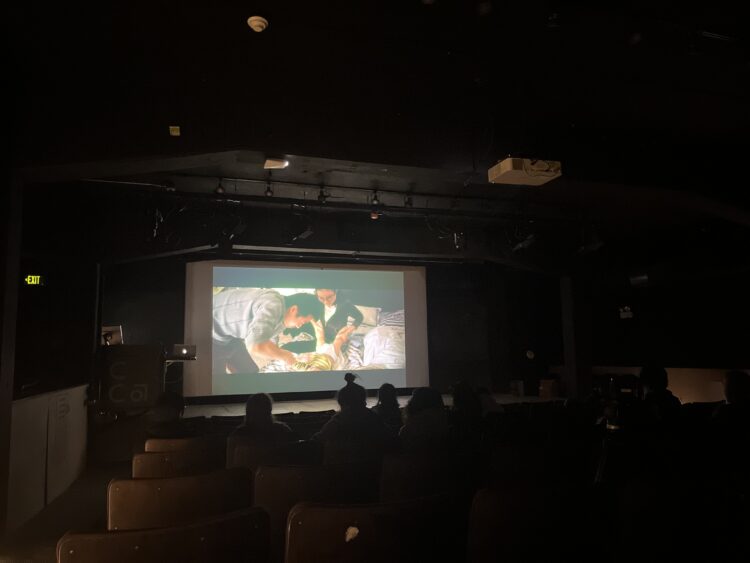Artist Diary: HouseFull of Blackwomen Prioritizes Process Over Product
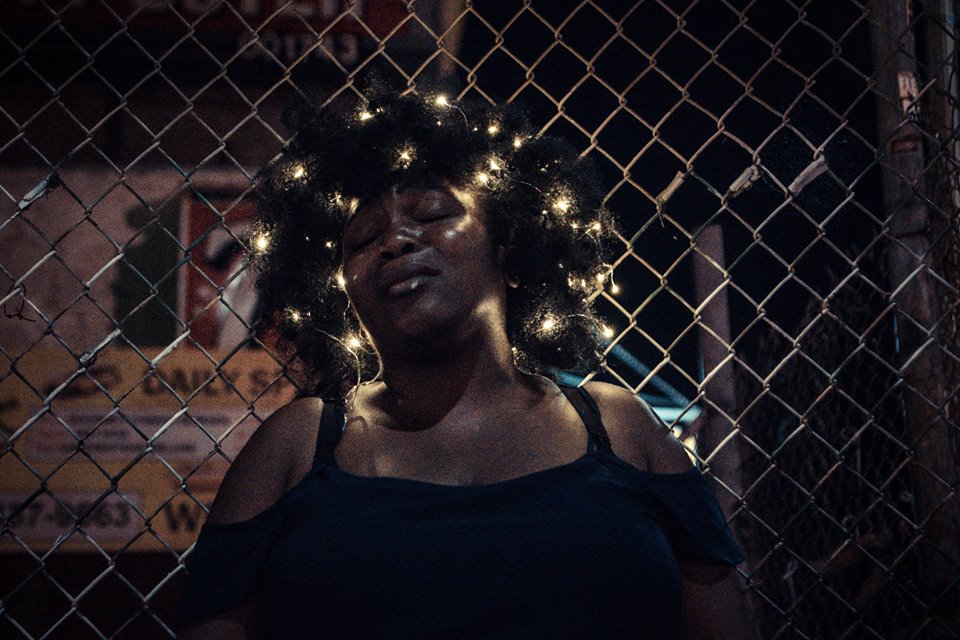
HouseFull is a site-specific dance-theater piece addressing issues facing women of color in Oakland, CA. The episodes, performed in various public sites throughout Oakland, shed light on both the troubling issues of sex trafficking and the rampant displacement of long-time residents. Weaving together dance, music, visual art, spiritual rituals and personal narratives, HouseFull asks, what happens when we lose our mothers’ homes?
Artists Ellen Sebastian Chang and amara tabor-smith were awarded the Creative Capital Grant in 2016 for the project. Since then, they have created over a dozen episodes that have inspired and engaged their community. As they prepare for the final performance, Episode 15: this too shall pass, they share share the story of the making of the project in their Creative Capital Artist Diary.
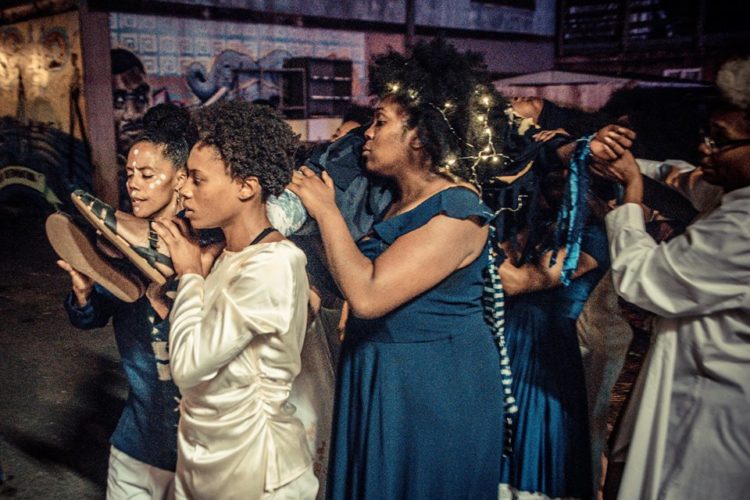
Performance of HouseFull, Oct 2016. Photo by Robbie Sweeney.
“Suspend yea notions of time, we can’t keep track of that in this place, of dis’place.”
HouseFull of Blackwomen is conjure art, the insistence movement, activated in store fronts, streets, houses, warehouses, museums, galleries and theaters of Oakland, California. HouseFull began as a two-year project and morphed into an eight-year process of 15 public “episodes” which unexpectedly appeared as street processions, all night song circles, secret rituals of Black women resting and dreaming, sacred ceremonies on the track, and multi-media offerings. Black women gathered around a dining room table to recall, rage, rally and restore themselves, while creating ritual performance strategies towards shifting systemic evictions, displacements, erasure and the sex trafficking of Black women and girls: all driven by the core question, “How can we, as Black women and girls, find space to breathe, and be well in a stable home?”
“When we think of productivity, it is a word that feels like it’s about making something, producing a product. Over the last five years, we’ve prioritized our process over product. We started with a two-year project where the timeline dissolved because we felt we were just digging into what our process was. That process included trust-building, cultivating rituals to support the work. My work as a dancer/performance-maker is rooted in Yoruba ritual and a commitment and focus that came out in the open eight years ago. The process is driven by cultivating ritual and listening to each other. These things don’t seem productive by a standard of “we got in a studio, and we made a piece, and it goes like this.” The work has been driven by our conversations, our experiences with members in our larger community, our check-ins, which informed the next episode.”
Creative Capital as the first major financial support of HouseFull instilled in us the belief that we could take our time, that we could focus on creating the work in the spirit(s) that we were exploring which felt unconventional at the time we began. We wanted to focus locally: the work was for Oakland and the greater bay area but set in Oakland. We wanted the focus of the work to serve Black women, which included ourselves. We wanted to rethink so many standards and conventions of “performance/dance/publicity and even how we wrote grants. Creative Capital added a “cache” which was helpful as the opener of other doors of funding and access. This gave us just enough to pay stipends to all the women involved including payments for our house/table meetings. Creative Capital continues to be important as a center of ongoing connections, conversations, and consultation.
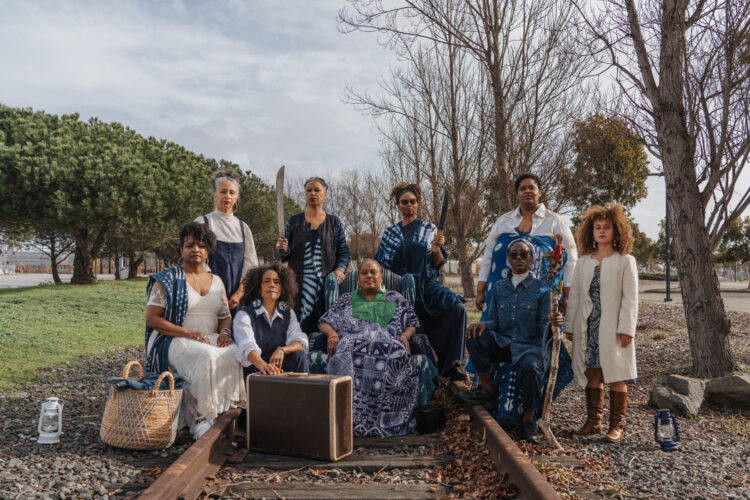
Photo by Robbie Sweeney.
Opening March 2023, Episode 15: this too shall pass is the “premiere,” the opening of HouseFull of Blackwomen as blueprint for Oakland and the Bay Area. We are still in process as we write this artist reflection. We sat together at the big table where we began (2015) for the first time since February 2020. We felt who was there, not there, who was far away, who had transitioned and who “we have no idea” where. It was a big moment for us. We felt “this too shall pass.”
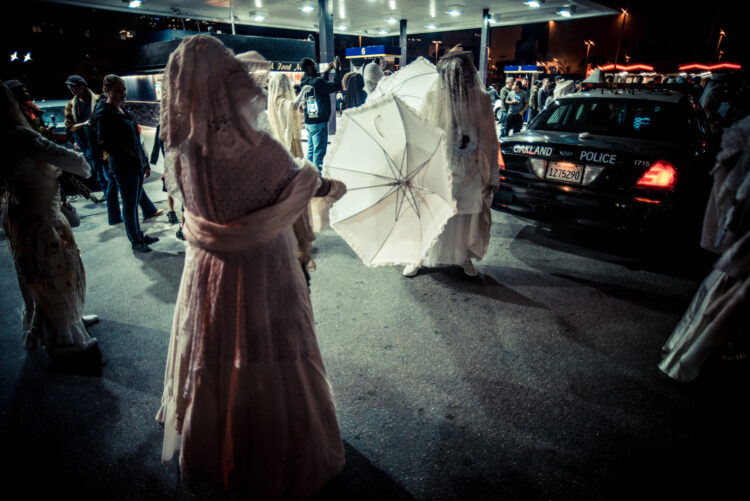
Streets of Downtown Oakland First Friday’s, May, 2016. Photo by Robbie Sweeney.
Episode 5: Now You See Me. The prayer was to bring the truth to the light around sex trafficking of Black women and girls in Oakland. Later that month, there was the exposure of police in Oakland who were involved in sex trafficking. The chief of the police had to step down. We lost three police chiefs within a two-week period over this issue. The Truth Needs to Come to the Light.
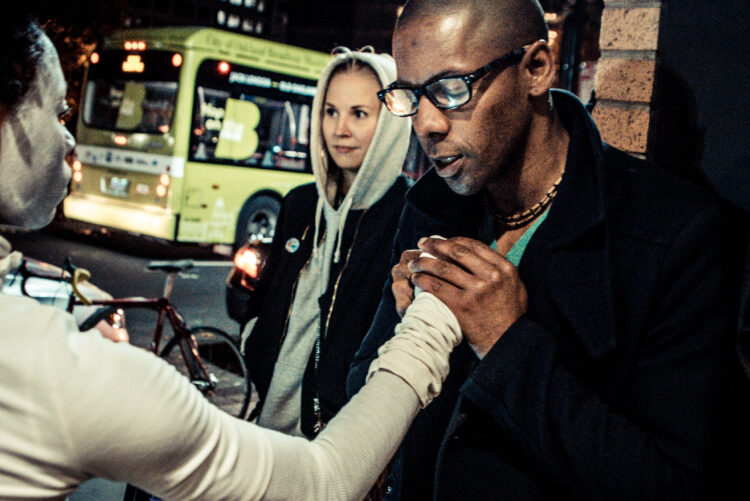
Photo by Robbie Sweeney.
All the processions of HouseFull, they just happened, like an occurrence, unannounced, and unadvertised. How we feel in the natural world when we feel something move invisibly, ‘Ohhh did you feel that?’ So many people who were living on the streets were so drawn to the processions.
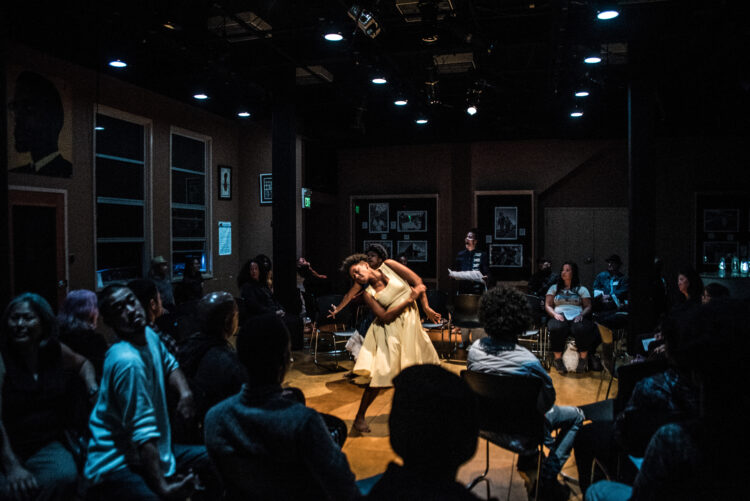
Eastside Arts Alliance East Oakland, October 2016. Photo by Robbie Sweeney.
Episode 6: the meaning of canaries. What possibly could displacement feel like? We set up chairs in like a crazy maze, and chairs didn’t face any one direction. Some chairs just faced a wall, and some chairs faced the center of the room. You don’t know what direction to go in. The dancers danced among audience members.
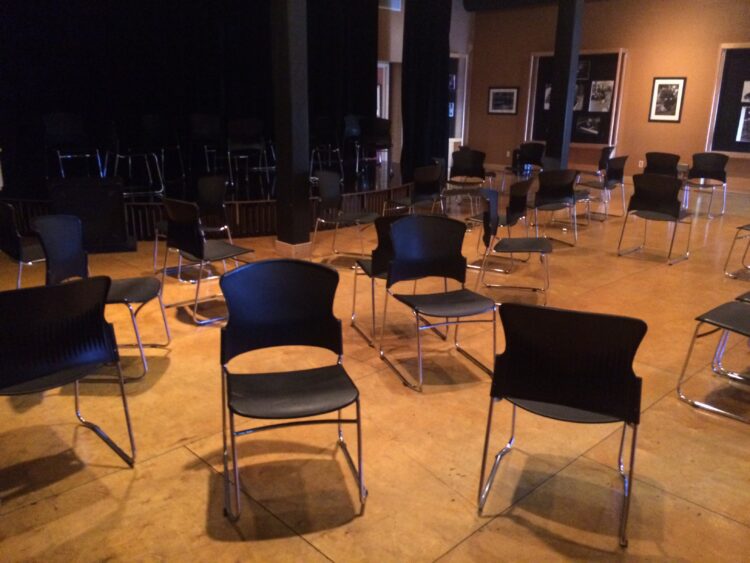
Eastside Arts Alliance East Oakland. Photo by Ellen Sebastian Chang.
Bit by bit performers would take groups of 10 people and have them leave the room. Finally, there were only 10 people left. Where did everybody go? Who is left here with me in this place I once called home?
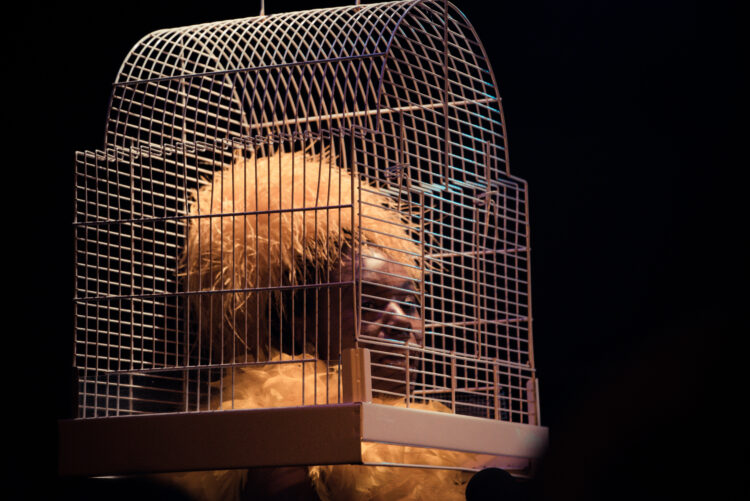
Eastside Arts Alliance East Oakland. Photo by Robbie Sweeney.
At the end of Meaning of Canaries, the audience comes back into the theater. Zakiya Harris is dressed as a kind of a nightclub chanteuse, she’s singing Nina Simone songs, Abby Lincoln, you know all these songs. In between the medley she’s doing pitter patter of like, ‘Where are you from? Where were you born? Oh, you’re from Oakland. Well, tell me what you remember.’ The audience just started yelling the names, grocery stores, shops, hang outs, nightclubs, and all the spots that are not around anymore.
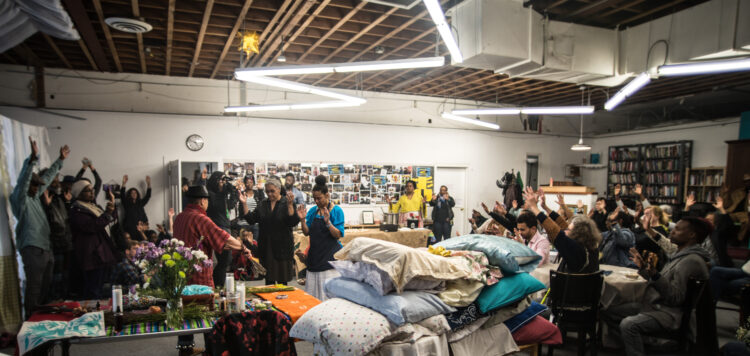
Chapter 510 and The Department of Make-Believe Uptown Oakland, March 2017. Photo by Robbie Sweeney.
Episode 9: Black Women Dreaming “a ritual of rest.” We gathered monthly at a table to just check in, see how we’re doing. A lot of the episodes have been born from our conversations of checking. Many check-ins began with various women expressing ‘I’m exhausted. I’m so tired. I can’t keep up.’ amara was joking, but was like, “Well, damn. We need to do an episode where we sleep.”
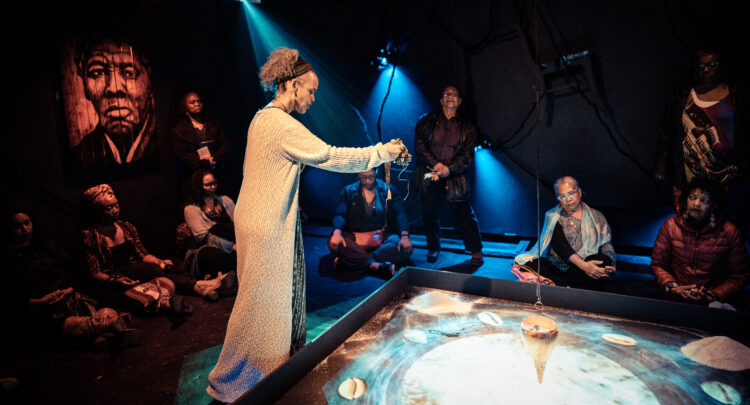
Ashara Ekundayu Gallery (Closed) Uptown, March 2019. Photo by Robbie Sweeney.
Episode 11: Black Womxn Dreaming “divine the darkness.” gina breedlove sound healing. Design was by Alexa Burrell, Shelly Davis Roberts, and Stephanie Johnson.
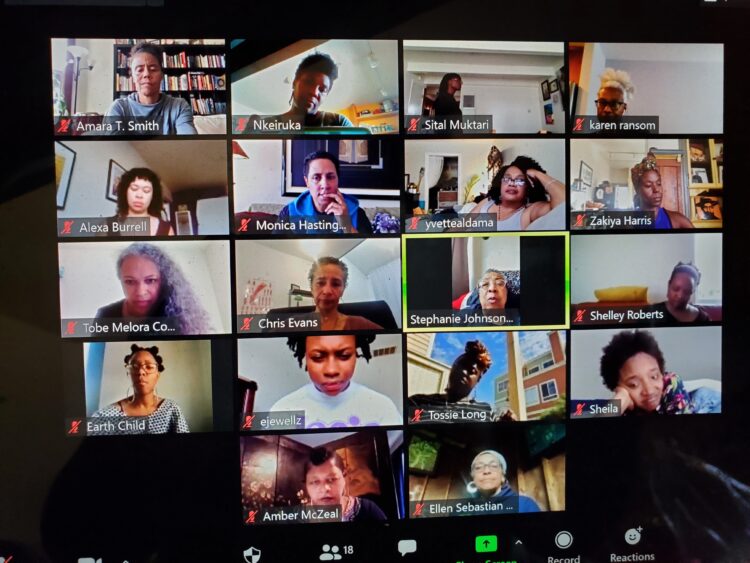
Screen Shot, 2020.
COVID Planning for Episode 14: New Chitlin Circuitry “a reparations vaudeville.” The immediate challenges were not being able to be together in the space the way we have done for the last six years…We ended up having to transform our project and think about performance differently. The idea of transferring our performance work to be on Zoom was not anything any of us found inspiring our imaginations. It was difficult to figure out how to be physically distant while socially intimate.
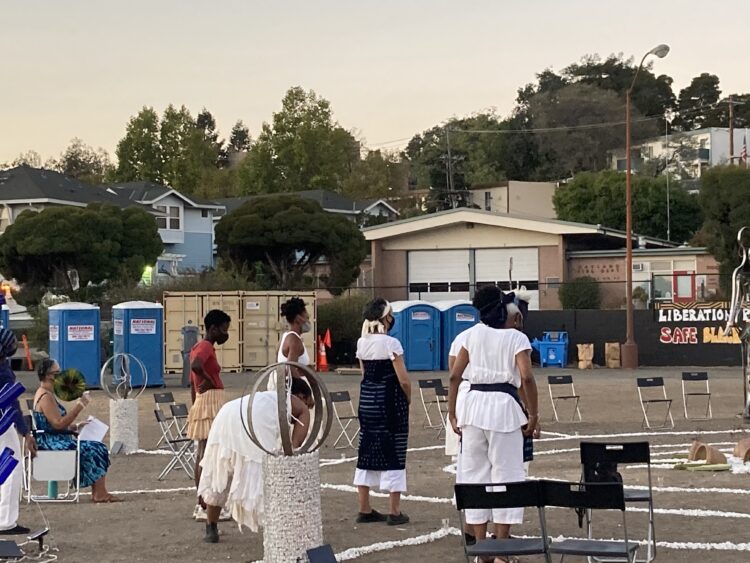
Rehearsals for Episode 14: New Chitlin Circuitry “a reparations vaudeville.” Black Cultural Zone/Liberation Park Deep East Oakland. Photo by Ellen Sebastian Chang.
We made a commitment to work outside and also indoors with very small amounts of masked audience. We trusted that physical distancing was not social distancing and we needed to be in proximity to each other and our community. We trusted the power of storytelling to continue to connect us and others.
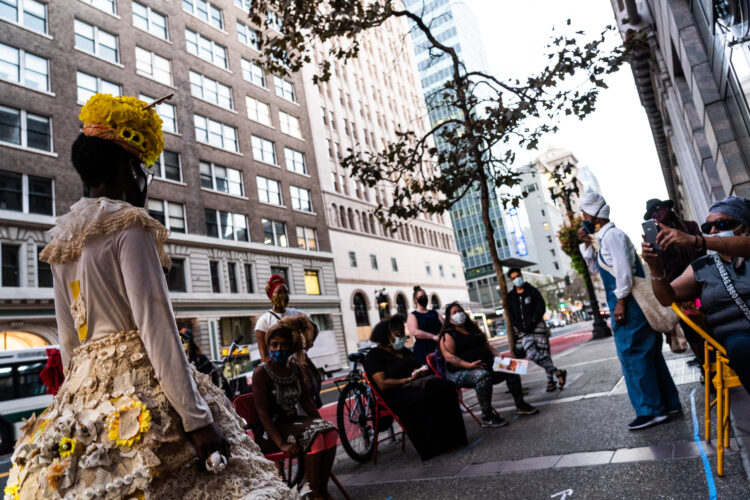
Betti Ono Gallery Downtown Oakland. Photo by Robbie Sweeney.
Due to limits inside the gallery – people also watched from the streets through the large windows.
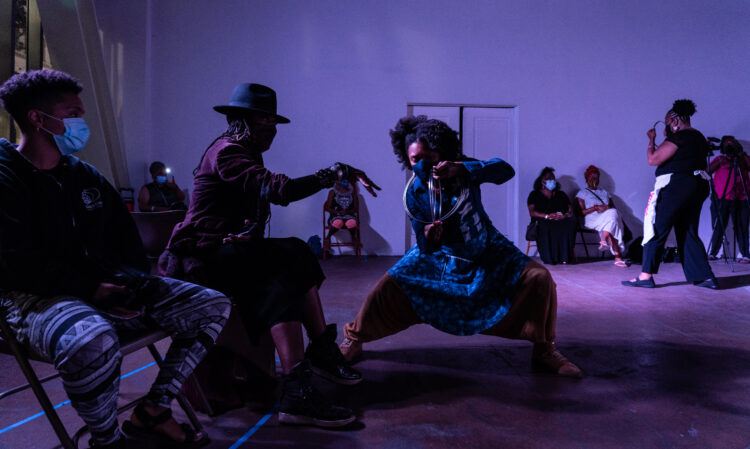
Betti Ono Gallery Downtown Oakland. Photo by Robbie Sweeney.
We worked with magician David Hirata to teach three women, Keisha Turner, Yvette Philips Aldama, and Zakiya Harris simple magic tricks performed to a recorded prayer by artist Vanessa German.



In the spirit of continuous ongoing/we are here to stay/where we live in the AfroNow/where we become our own myths and legends/where we say you had to BE There! HouseFull of Blackwomen is alive everywhere always and ever. If you looking for us you will find us. We carry mirrors for reflection and small lanterns for just enough light in the dark….
The final episode of HouseFull, Episode 15: this too shall pass will premiere March 4–12, 2023. Performance times, venues and details can be found here. All events are sold out, but you can sign up for the mailing list to learn about future performances and project iterations.
